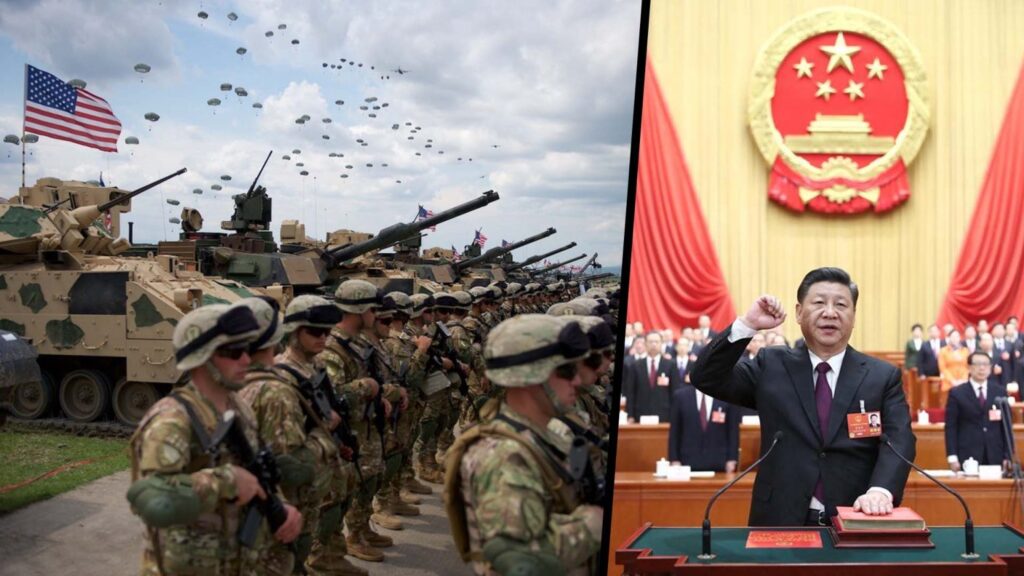The document analyzed the ways in which the United States has “abused” its hegemony politically, militarily, economically, financially, technologically, and culturally.
China’s Foreign Ministry noted that Washington has roughly 800 foreign military bases all around the world and has launched 400 foreign military interventions.
The United States committed genocide against Indigenous nations, imposed its colonialist “Monroe Doctrine” in Latin America, and annexed independent territories like Hawaii, Beijing pointed out.
China denounced the US for sponsoring coups, regime-change operations, and “color revolutions” in dozens of countries, while constantly spreading “misinformation” and propaganda to destabilize foreign adversaries.
Just since 2001, US wars have killed hundreds of thousands of civilians, wounded millions, and created tens of millions of refugees, Beijing recalled.
These devastating facts were laid out in the report “US Hegemony and Its Perils“, which China’s Foreign Ministry released on February 20. It was subsequently republished by major Chinese media outlets.
Beijing said the goal of the report was to “draw greater international attention to the perils of the U.S. practices to world peace and stability and the well-being of all peoples”.
The Foreign Ministry wrote:
Since becoming the world’s most powerful country after the two world wars and the Cold War, the United States has acted more boldly to interfere in the internal affairs of other countries, pursue, maintain and abuse hegemony, advance subversion and infiltration, and willfully wage wars, bringing harm to the international community.
The United States has developed a hegemonic playbook to stage “color revolutions,” instigate regional disputes, and even directly launch wars under the guise of promoting democracy, freedom and human rights.
Clinging to the Cold War mentality, the United States has ramped up bloc politics and stoked conflict and confrontation.
It has overstretched the concept of national security, abused export controls and forced unilateral sanctions upon others.
It has taken a selective approach to international law and rules, utilizing or discarding them as it sees fit, and has sought to impose rules that serve its own interests in the name of upholding a “rules-based international order.”
The US is the No.1 saboteur of international rules & order. Hegemony is the hallmark of its approach to international rules & international affairs. pic.twitter.com/mcjF3Cg1YK
— Spokesperson发言人办公室 (@MFA_China) February 21, 2023
Political hegemony
China condemned the countless examples of “U.S. interference in other countries’ internal affairs”.
It noted that the US has treated Latin America as its colonial territory with the so-called “Monroe Doctrine”.
Beijing denounced Washington’s illegal, 61-year blockade of Cuba; the 1973 CIA coup against Chile’s democratically elected President Salvador Allende; and the Donald Trump administration’s attempt to overthrow Venezuela’s government.
China likewise blasted the “color revolutions” and “regime change” operations that the United States supported in George, Ukraine, Kyrgyzstan, and beyond.
“The U.S. exercises double standards on international rules. Placing its self-interest first, the United States has walked away from international treaties and organizations, and put its domestic law above international law”, Beijing wrote.
“The U.S. arbitrarily passes judgment on democracy in other countries, and fabricates a false narrative of “democracy versus authoritarianism” to incite estrangement, division, rivalry and confrontation”, it added.
Military hegemony
“The history of the United States is characterized by violence and expansion”, the Chinese Foreign Ministry wrote, explaining:
Since it gained independence in 1776, the United States has constantly sought expansion by force: it slaughtered Indians, invaded Canada, waged a war against Mexico, instigated the American-Spanish War, and annexed Hawaii.
After World War II, the wars either provoked or launched by the United States included the Korean War, the Vietnam War, the Gulf War, the Kosovo War, the War in Afghanistan, the Iraq War, the Libyan War and the Syrian War, abusing its military hegemony to pave the way for expansionist objectives.
In recent years, the U.S. average annual military budget has exceeded 700 billion U.S. dollars, accounting for 40 percent of the world’s total, more than the 15 countries behind it combined.
The United States has about 800 overseas military bases, with 173,000 troops deployed in 159 countries.
“As former U.S. President Jimmy Carter put it, the United States is undoubtedly the most warlike nation in the history of the world”, Beijing added.
It cited a Tufts University report that found that the United States carried out almost 400 military interventions from 1776 to 2019.
Since 2001, US wars have killed hundreds of thousands of civilians, injured millions, and created tens of millions of refugees, China pointed out.
Economic hegemony
“By taking advantage of the dollar’s status as the major international reserve currency, the United States is basically collecting ‘seigniorage’ from around the world; and using its control over international organizations, it coerces other countries into serving America’s political and economic strategy”, the Chinese Foreign Ministry wrote.
It identified the “hegemony of U.S. dollar” as “the main source of instability and uncertainty in the world economy”.
Through the use of sanctions and other measures, “The United States willfully suppresses its opponents with economic coercion”, and “America’s economic and financial hegemony has become a geopolitical weapon”, Beijing warned.
Technological hegemony
“The United States seeks to deter other countries’ scientific, technological and economic development by wielding monopoly power, suppression measures and technology restrictions in high-tech fields”, China said.
Beijing condemned Washington’s global use of cyber attacks and surveillance.
“The United States monopolizes intellectual property in the name of protection”, it wrote.
“The United States politicizes, weaponizes technological issues and uses them as ideological tools”, it added.
Cultural hegemony
“The United States has often used cultural tools to strengthen and maintain its hegemony in the world”, the Chinese Foreign Ministry said.
Washington uses movies, TV shows, and media outlets as weapons of soft power, Beijing pointed out.
“U.S.-dominated Western media has a particularly important role in shaping global public opinion in favor of U.S. meddling in the internal affairs of other countries”, it wrote.
Citing a report from The Intercept, the Chinese Foreign Minister noted how the “U.S. Department of Defense manipulates social media”, spreading war propaganda on Twitter, Facebook, and other platforms.
“The United States uses misinformation as a spear to attack other countries, and has built an industrial chain around it”, Beijing warned.
US propaganda is “targeting socialist countries” in particular, it noted, stressing that Washington “pours staggering amounts of public funds into radio and TV networks to support their ideological infiltration, and these mouthpieces bombard socialist countries in dozens of languages with inflammatory propaganda day and night”.
_____________________________________
 Benjamin Norton is an investigative journalist, analyst, writer and filmmaker. He is the founder and editor of Multipolarista and is based in Latin America. His website: BenNorton.com (Publicaciones en español aquí.)
Benjamin Norton is an investigative journalist, analyst, writer and filmmaker. He is the founder and editor of Multipolarista and is based in Latin America. His website: BenNorton.com (Publicaciones en español aquí.)
